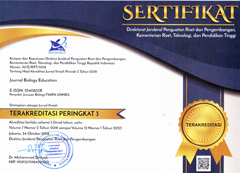Development of E-Modules Based on Problem Based Learning Assisted by Flipbook on Environmental Change Material in High School to Improve Problem Solving Ability
Abstract
The use of printed teaching materials in schools is less attractive to students and the ability to solve problems owned by students is relatively below average so that the basic competencies set have not been achieved. Advances in science and technology can be utilized to provide more varied teaching materials such as e-modules. The purpose of this study was to analyze the feasibility, practicality and effectiveness of e-modules in the learning process. The research design used is development (R&D) using the ADDIE model with the stages of analysis, design, development, implementation, and evaluation. The feasibility of e-modules is determined based on the validation of material experts and media experts. The practicality of e-modules is determined based on student responses and teacher responses. The effectiveness of e-modules is determined based on students' classical completeness and N-gain. The results showed that the material expert validation value was 90.27% (very feasible) and the media expert validation value was 92.85% (very feasible). The results of the e-module's practicality was that the teacher rated it as very practical. In the small-scale trial, all students rated practical. In the large-scale trial, 90.32% of students rated very practical and 9.68% of students rated practical. The effectiveness of the e-module was proven to be effective in improving students' problem solving ability with an N-gain of 0.61 with a medium category and a classical completeness of 93.33%.





